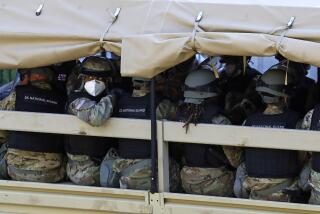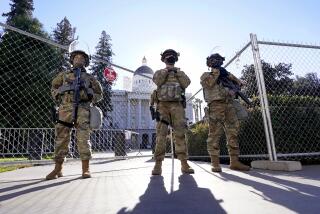Influence of Quayles Unneeded, Data Shows : Guard Had Openings and No Waiting List; Furor Seems Likely to Subside but Damage Is Uncertain
- Share via
INDIANAPOLIS — With the release of a batch of new documents by the Indiana National Guard, the question of whether family influence allowed Indiana Sen. Dan Quayle to enter the Guard while others waited has been answered: The influence did not matter.
Vacancies existed in the Guard for several months around the time he applied, documents from the period released in recent days show. Indiana Guard officials who have researched the subject say the unit did not have a waiting list. On May 18, 1969, the day before Quayle enlisted, his unit was 11 positions under its assigned strength for enlisted personnel.
Size of Unit Increased
Less than two months before Quayle joined the Guard, an order was issued to increase his divisional headquarters unit’s strength to bring it up to authorized capacity, according to a Guard document.
And, although Quayle did ask influential friends of his powerful family for help in obtaining a spot, Guard officials say their research shows he did not circumvent any official application process, because there was none. The Indiana Guard at the time apparently did not have a recruitment office; recruitment was done informally.
“Recruitment at the time was all by word of mouth,” said Capt. Cathi Kiger, an Indiana National Guard spokeswoman who has researched the issue since the Quayle controversy began.
Such informal recruitment apparently worked, at least at the time, for both powerful and average citizens alike. Within a week of the time Quayle enlisted in the headquarters detachment on May 19, 1969, two others, with apparently no political connections, joined the same unit.
One, Stephen Morell, an unemployed truck driver from Indianapolis, told the Associated Press this week that he was offered a clerk-typist’s position in Quayle’s unit just three days after undergoing preliminary testing in May, 1969. Morell said he heard about a vacancy in the unit from his brother, who was a cook in the Guard.
Morell, a college dropout at the time, told reporters that his brother talked to the company commander about getting him a slot in the unit.
Despite such new evidence supporting Quayle’s assertions that he entered the Guard fairly, questions about whether Quayle, an ardent hawk, sought to avoid service in Vietnam by joining the Guard are still likely to be raised. Quayle has said he wanted to enter law school, but the records show that Quayle sought to enter the Guard with the draft breathing down his neck. At the time, Quayle was a senior at DePauw University and was eligible to be drafted in a matter of weeks when his student deferment ran out on May 25, which was graduation day.
And the affair has also clearly demonstrated that Quayle came from a family of influence and that he did not hesitate to use it. The political fallout from the public exploration of that fact is still to be measured.
But, after a week of frantically searching through dusty old files, Indiana National Guard officials believe they now have a fairly complete picture of the situation in the Guard at the time Quayle enlisted.
As Guard officers note, Quayle may indeed have used his influence to enter the Guard, as he had used such influence at other critical junctures in his life.
But the crucial point is that he didn’t need to.
No Special Consideration
“I can find no evidence that he was given special consideration and there was no need,” Kiger told reporters. “Units that were not up to 100% strength could continue to recruit.”
When Quayle enlisted on May 19, 1969, the headquarters unit’s officer corps was five positions over its authorized strength, but, with the 11 openings in the enlisted ranks, the detachment was six positions under its authorized levels.
At the same time, the state’s National Guard contingent of 10,378 as a whole was over its authorized strength by 52 positions on June 30, 1969, according to the Guard’s annual report for the year. But the report said also that the Guard needed to fill 2,500 positions expected to come open in 1969 as a result of resignations by soldiers who had fulfilled their obligations.
Meanwhile, Guard officials have come across conflicting data that suggests the report of a 52-man surplus was an early estimate and that the Guard was actually under strength by 77 positions on June 30.
‘No Waiting List’
Retired Maj. Gen. Robert Moorhead, former commanding general of the Indiana National Guard’s 38th Infantry Division, said, “There was no waiting list. The unit was under strength and anybody could have walked in off the street and gotten into this unit” if they qualified.
Perhaps the key document released this week was a March 17, 1969, order authorizing the headquarters detachment to increase its strength to 100% of its allowable level, effective April 1, 1969. Earlier, some questions had been raised as to whether a freeze on filling some authorized positions might have been in effect at the time; that would have meant that, despite being under strength, Quayle’s unit had no real openings. But the March 17 order clearly allowed the unit to add positions.
Not all of the information disclosed by the Guard favors Quayle. Guard documents released Friday show that Quayle was AWOL, absent without leave, on at least one occasion. The daily records of his unit’s weekend drills show that he simply skipped the final weekend of duty in his six-year enlistment period. He was apparently not disciplined for the absence, however.
A Guard spokesman said Friday that such an absence for an entire weekend would have resulted in four disciplinary citations, and that five such citations were necessary before disciplinary action was taken. Quayle, like a number of Guardsmen at the time, could have known he had no citations and thus skipped the final weekend without penalty.
Some former Guard members still disagree about how easy it was to get into the headquarters detachment, insisting it was among the most highly coveted assignments in the Indiana Guard and would have been among the most difficult to get into.
‘The Glory Unit’
“That was the glory unit. Long waiting lists were quite common during that time,” recalled David Reyman, a former Guard unit administrator in Newcastle, Ind. “It was not unusual for somebody to put pressure on a commander to get somebody in.”
It has been widely acknowledged that Quayle’s father, newspaper Publisher James C. Quayle, exerted influence at his son’s request to get him into the Guard.
Wendell Phillippi, then managing editor of one of the Pulliam family-owned newspapers and a retired officer of the Guard, recalls that the elder Quayle asked him to see what he could do. He said Dan Quayle later came to the newsroom to talk to him personally about the request.
Phillippi said he phoned the office of the adjutant general at Guard headquarters and “talked to whoever answered the phone.”
“I said he was a good man and we ought to get him in,” Phillippi recounted.
At Wendell Phillippi’s request, said Alfred Ahner, a now-retired National Guard general, he held open a spot for Quayle but believes there was nothing improper about it. Ahner told reporters other Guard officials informed him that there were “three or four vacancies” at the time Quayle was seeking admission.
“I said: ‘Hold one of them, there’s a good guy coming over,’ ” Ahner recalled. “I couldn’t have done a thing for Wendell if there hadn’t been a vacancy.”
Col. Wyatt Cole, now retired, and Sgt. Vernon Maddox both said they recalled Phillippi’s influence. Neither could remember if there was a waiting list on the day Quayle was accepted, but both said that later, by the end of 1969, the Guard had waiting lists that were from six weeks to three months long.
Both Cole and Maddox believe Quayle benefited from the influence of his family-owned newspaper empire, whose editorials had strongly backed then-Gov. Edgar D. Whitcomb, commander in chief of the guard.
“Let’s face it,” Cole said: “Eugene Pulliam was as good as in the governor’s office.”
Pleaded Poor Memory
Fueling the controversy over influence, Quayle initially claimed a poor memory when he was asked at his first press conference during the Republican National Convention in New Orleans about the circumstances surrounding his Guard enlistment.
“Phone calls were made,” he said but insisted he did not know the details. At another point, when asked what he was thinking when he decided to join the Guard rather than fight in Vietnam, Quayle replied:
“I did not know in 1969 that I would be in this room today.”
Two days later, appearing at a hometown rally in Huntington, Ind., Quayle said he did not join the National Guard to avoid combat in Vietnam but simply to have the freedom to go to law school.
“I asked no one to break any rules, and, as far as my knowledge (goes), no rules were broken at all,” he said.
Selective Service figures show that 533,898 men had registered with the draft in Indiana by the end of 1969, and that only 8,553 men were drafted from Indiana that year. There were 23,504 men in Indiana that year who held a 1D draft deferment, like Quayle, as a result of their membership in an ROTC or National Guard unit.
Few Blacks in Guard
But, while some blue-collar men joined the Guard, it was primarily an option for the affluent. The elitism of the units is illustrated by the fact that on Dec. 31, 1966, the closest date to 1969 for which figures could be found, there were only 81 blacks among the 11,550 members of the Indiana Guard.
While the dust settles on the Guard controversy, some voters of Quayle’s era are reacting to the issue with a wry sense of humor. Washington attorney John M. Bray, for example, recalled that “many of us beat down doors and tried to finagle through friends to get into the Guard or a reserve unit. If Quayle was among the elite, it was an elitism that we all aspired to.”
Republican pollster Linda DiVall told The Times she does not believe the issue will damage Quayle permanently.
“I don’t think it’s going to hurt him ultimately, and, in fact, it may help the ticket to some degree by bringing the question of patriotism to the forefront. I know it has pained some people in the short run by causing them to focus on an era they don’t want to think very deeply about.”
More to Read
Sign up for Essential California
The most important California stories and recommendations in your inbox every morning.
You may occasionally receive promotional content from the Los Angeles Times.










